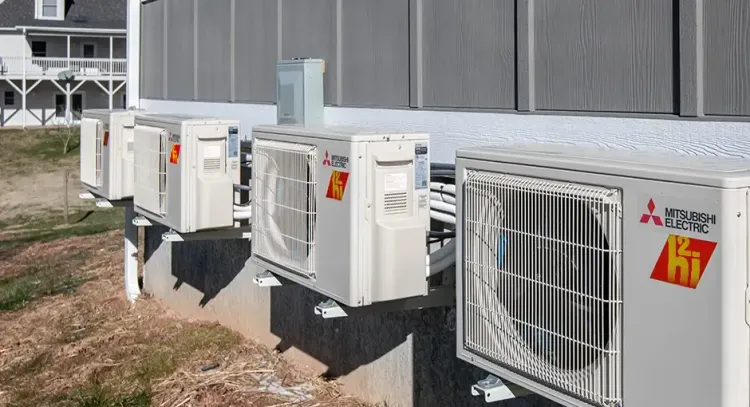More homeowners than ever are aware of how heat pumps and Zoned Comfort Solutions® can save them money while making their homes more energy efficient. If you’ve looked into why Zoned Comfort Solutions from Mitsubishi Electric are up to 40% more efficient than conventional heating and air conditioning systems, you’ve encountered mentions of “variable capacity.” You’ve also found the same when investigating why these HVAC systems excel at maintaining preferred temperatures.
Since the ability to vary capacity is a differentiator, let’s take a look at why it’s significant.
Design Conditions Are Not Common Conditions
Your contractor will consider many variables when designing a system. These include how you’ll use each space in your home (e.g. your bedroom versus your kitchen) and the range of temperatures common in your region. HVAC equipment capacity is selected based on design temperatures, the warmest and the coldest outdoor temperatures a home is likely to experience. Design temperatures only occur a few times a year. For example, per Energy Vanguard1, if you live in Atlanta, Georgia, you can expect outdoor temperatures to be warmer than your winter design temperature of 23°F for about 99% of all hours in a year. Similarly, in Atlanta, outdoor temperatures are cooler than the summer design temperature of 91°F for about 99% of all hours in a year. Both figures are based upon a 30-year average.
In moderate temperatures, conventional systems, like traditional central air conditioners, furnaces and boilers, use the capacity and power needed during design temperatures, which only occur during 1% of all hours in a year. They are fixed-capacity systems.
Variable-capacity systems, and Zoned Comfort Solutions in particular, use only the amount of energy needed to keep each room in your home at your preferred temperature or set point. During design temperatures, the system will run full blast, but on a typical day, when full capacity is unnecessary, Mitsubishi Electric systems will save you money while providing comfort in each room or zone.
Part Of The Load Goes A Long Way
A load is the amount of heating or cooling required by a space. Since design temperatures occur infrequently, homes experience partial-load conditions on most days. Variable-capacity systems provide a clear advantage over fixed-capacity systems when there is only a partial load. But partial loads vary. Loads in your home will change based upon the time of day, the season, whether a room is occupied, and how you are using a space (e.g., cooking, having a dance party). Through a combination of sensors and an INVERTER-driven compressor, Zoned Comfort Solutions vary capacity to keep up with changing loads and maintain individual set points for each of your custom comfort zones.
Conventional systems can’t handle ever-changing partial loads as efficiently as Mitsubishi Electric systems. It’s commonly understood by industry professionals that a central air-conditioning system runs at full capacity and then shuts off after driving the temperature a couple degrees below the set point. Once the room drifts up above the set point, the central system will kick back on. This causes occupants to feel drafts and also makes a central system less effective than a variable-capacity system at removing moisture and eliminating hot and cold trouble spots. As this energy-intensive on/off cycle repeats throughout a day, a central system wastes electricity and creates noise each time it turns on and off. By contrast, Zoned Comfort Solutions run continuously, efficiently and quietly, providing comfort and passive dehumidification in every room.
It’s not hard to see how the ability to vary capacity makes Zoned Comfort Solutions more efficient than conventional fixed-capacity systems. For more reliable comfort, lower utility bills and greater sustainability, this is the heating and cooling technology of choice and the future.
[1] Bailes, Allison. “We Are the 99% - Design Temperatures & Oversized HVAC Systems.” Energy Vanguard, 10 May 2012, link here.









